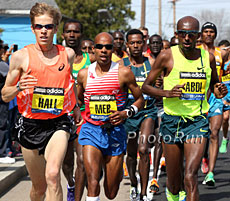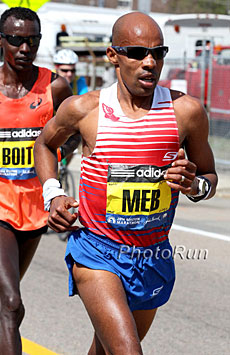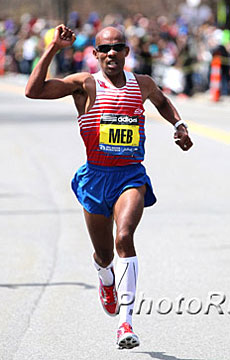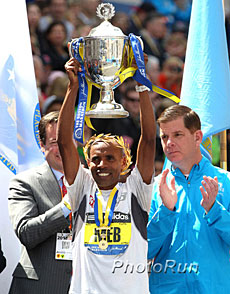More Coverage Links:
Coverage Homepage
Post Race:
Men's Race and Commentary
Women's Race and Commentary
Complete Searchable Results
Race Day: As It Happens - Live Coverage (the real-time notes/mile-by-mile)
Pre-Race:
Race Preview & Starter Lists |
Elite Athlete Past Matchups |
Prize Money
Weekend Experience:
Pace Calculator/Spectator Guide |
Course Experience As a Runner
Extras:
Athlete/Course Videos |
Boston Marathon Books|
More News: Press Releases |
News
The 118th Running of the Boston Marathon - The Men's Race
by John Elliott
America and Running/Boston
Americans by nature seem to be insecure about some things... We want to believe we are the greatest country in the world... The baseball championships in the USA are known as the "World Series" and the winner is the "World Champion..." Yet, when it comes to running, we fear that we are far behind all other countries. And the greatest sense of shame comes from statements surrounding the Boston Marathon, a race that had not seen an American winner since 1985 on the women's side and 1983 on the men's side. No American man had won the Boston Marathon in over 30 years!
By the time you are reading this article, it is probably no surprise that Meb Keflezighi - an American - broke the American drought at Boston at the 2014 race. The oldest marathon in the USA (and oldest continually running in the world) was won by one of its own. And, truth be told, there were a couple of times in the last dozen years when we've suspected Boston Marathon race directors of setting up a weak field to try to let an American win - but that was not the case for 2014.
Pre-race, we all knew it would be impossible for an American to win the 2014 Boston Marathon. In the field were eight Kenyan and Ethiopian runners with personal bests faster than any of the American runners - that is if we ignore Ryan Hall's "2:04:58" best time that was set in 2011 when a massive tailwind blew the runners down the Boston course to "world best" times. In the field was even the man we thought to be the newest best marathoner-ever, Dennis Kimetto, who ran 2:03:45 in Chicago six months prior.

photo credit: Victah Sailer |
Americans To The Lead
From the start, Meb Keflezighi took to the front of the race, at first joined by Ryan Hall. The Americans were showing that Boston was their race. The pace was quick from the start, but the first miles are downhill so the pacing is a bit deceptive - and the pace was such that 23 men felt it was okay for them.
At mile 7, Meb Keflezighi and Josphat Boit - two Americans - started to move away from the field. The rest of the runners knew this was a temporary and foolish move and that they would catch the two men later on the course. Keflezighi must have been known to most of the runners - he is a three time Olympian, Olympic Silver Medalist, 2009 New York City Marathon winner and 2012 Olympic 4th finisher. But they also knew Meb was on the tail end of his career...his swan song. At 38, and just two weeks shy of his 39th birthday, the field may have just thought he was no threat. And Josphat Boit? He was a late entry who had run just two previous marathons, his best being a runner-up finish at the 2013 USA Marathon Championships race in 2:13:14. Undoubtedly the other runners did not even know Boit, but if they had, those credentials would not have deterred them from letting him go.

photo credit: Victah Sailer |
Between miles 7 and 15, Keflezighi and Boit continued to add distance between themselves and the main pack of runners - lengthening their gap with the others to more than a minute. As the pair approached the Newton hills, Keflezighi decided that he should go forward on his own and ran away from Boit. In the back, ten men, mostly African, were concerned only with each other - they knew that soon enough they would catch the two men who were ahead. While the television cameras and lead truck were forward watching Keflezighi and Boit, most of the world could not see what was going on with the main pack - but some of the photographers who were continuously back and forth on the course via motorbike gave us some insight: "the pack in the back was running all over the road: Kogo would run to one side of the road hoping to drop the others and all would follow; when Kimetto was leading he would do the same." The runners were not taking the shortest distance or running efficiently...not smart. And we heard from Keflezighi that before the race one of the other coaches told him he would do well because he ran smart - apparently there was more to that than just words.
When asked why the pace pack didn't chase Keflezighi earlier, Wilson Chebet told us that the men in the main pack were just worried about each other and thought that they would catch Keflezighi by 35K. When they reached 35K and Keflezighi was nowhere to be seen, Chebet started to worry and broke from the rest of the runners to make chase. At the same time, we could see that Keflezighi's form was declining and he was turning to look back over his shoulder for the other runners. Generally, that is a bad sign as runners are taught to not look back - and it was a clear sign of concern. At 35K, Keflezighi was more than 1:15 ahead of the next competition, but just three miles further along the course, the differential had dropped by more than a minute; Wilson Chebet was twelve seconds back and closing.

photo credit: Victah Sailer |
Boston Strong / Meb Strong
After the 2013 Boston Marathon bombing, the city came together and the phrase "Boston Strong" was born. There was great feeling throughout the city and among the athletes over the weekend of the 2014 Marathon. Keflezighi had written the names of the four victims of the previous year's bombing on his bib and he told us that he looked down at those to take inspiration from them. As he ran, the words: "Boston Strong" ran through his head. And then, "Boston Strong / Meb Strong / Boston Strong / Meb Strong...." And those words helped to push him through. He also thought of his coach and his training and consciously focused on his form - doing everything that he could to hold it together.
We've always said that Meb Keflezighi is thet toughest runner ever formed. His innate running talent - measured by personal best times - is not nearly as great as some other runners, even many in the Boston Marathon crowd. But where other runners might give up or give in, Keflezighi will never stop pushing. Keflezighi was the underdog at the Boston Marathon - the oldest in the field and the man ranked 16th by previous best time (and even third American by time!) - but the toughness that allowed Keflezighi to take the Silver Medal at the 2004 Olympics; the win at the 2009 New York City Marathon; and every other accomplishment against "better" runners enabled Keflezighi to hold it together and extend and ultimately maintain his lead to win in a personal best finish time of 2:08:37. Undoubtedly, Keflezighi was the only American who could possibly break the American drought at Boston - he is a champion over his years of running and, as we know personally, the hardest working and most dedicated runner there is. A true, true champion.
The Rest of the Field
In the last mile, Chebet could make up no time on Keflezighi; and finished eleven seconds back in second place. Frankline Chepkwony broke from the main pack after Chebet and almost caught his fellow Kenyan to finish in third place in 2:08:50. Behind them, the rest of the men struggled in. Vitaliy Shafar of the Ukraine had a breakthrough race, holding on for fourth place in 2:09:37, nearly seven minutes better than his previous best marathon (26th place at 2012 Olympics in 2:16:36).
Other Americans
We started this article talking about America's concern with its insecurity about the quality of its distance runners. Beyond Keflezighi, are there others to continue to carry the mantle? We're not sure whether to characterize Josphat Boit's run as brave, aggressive, confident, smart or just foolhardy. But ultimately we will say that it showed a spirit that needs to be present in order for someone to be a champion. In the future he will either improve to live up to his bravery or he will continually overextend and fail. We look forward to the future for Boit.
The two Americans who, with Keflezighi, represented the USA at the 2012 Olympics and who were most favored in the race failed to perform. Ryan Hall holds the fastest times of any American marathoner - but he has failed to become the hero and achieve what Keflezighi has achieved; and in this race he was off the pace by mile 10. Abdi Abdirahman has a personal best 2:08:56 in the marathon and represented the USA at the Olympics, but he has failed to compete well at the distance and is not a marathoner at heart. The remaining American great marthoner, Dathan Ritzenhein, holds a 2:07:47 personal best, but has not compteted at the front of any marathon and seems more drawn to the 10,000m distance.
Nick Arciniaga has shown consistency and strength. As the reigning USA Marathon Champion, he beat all of the other Americans who showed up at the Championships race in October 2013; but his ability to run strong and ahead of the other Americans still leaves him a way to go before he can truly compete against the international fields. And the same can be said for Jeffrey Eggleston, a talented runner, but we can't currently see that he will be able to compete to be the next American to win Boston.
America Again
In the aftermath of any event, many are talking superlatives. An American winning the Boston Marathon - no matter how big you cut it - is big news. Many were talking about Meb Keflezighi's victory inspiring a new running boom and signalling that Americans can compete on the big stage. Only time will tell to what extent that can be true. But for himself Meb Keflezighi acknowledged the importance of this Boston win: the "one thing missing from his resume," which now includes an Olympic Medal, 22 USA National Titles and wins at the New York City and Boston Marathons. We asked if this meant he's going to be continuing to run through the 2016 Olympics - and there was no doubt in his smile that he will be there with hopes for another medal.

photo credit: Victah Sailer |
Top Finishers:
1. Meb Keflezighi (USA) 2:08:37 - $150,000
2. Wilson Chebet (KEN) 2:08:48 - $75,000
3. Frankline Chepkwony (KEN) 2:08:50 - $40,000
4. Vitaliy Shafar (UKR) 2:09:37 - $25,000
5. Markos Geneti (ETH) 2:09:50 - $15,000
6. Joel Kimurer (KEN) 2:11:03 - $12,000
7. Nicholas Arciniaga (USA) 2:11:47 - $9,000
8. Jeffrey Eggleston (USA) 2:11:57 - $7,400
9. Paul Lonyangata (KEN) 2:12:34 - $5,700
10. Adil Annani (MAR) 2:12:43 - $4,200
11. Josphat Boit (USA) 2:12:52 - $2,600
12. Craig Leon (USA) 2:14:28 - $2,100
13. Mike Morgan (USA) 2:14:40 - $1,800
14. Koichi Sakai (JPN) 2:14:56 - $1,700
15. Lusapho April (RSA) 2:14:59 - $1,500
|








